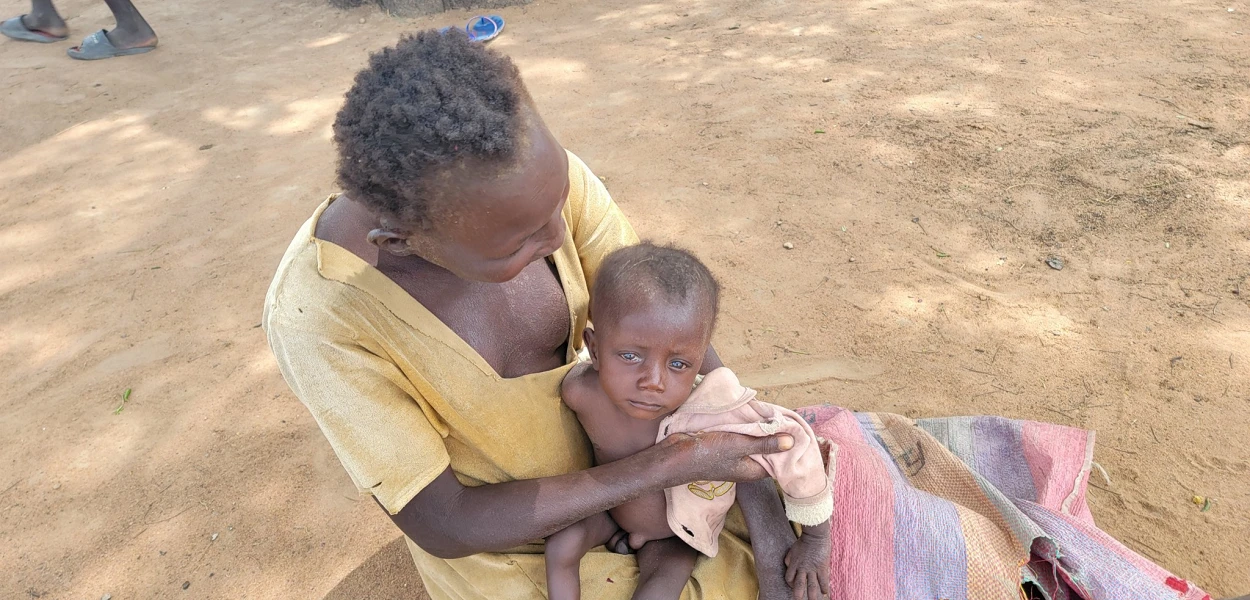
“The hunger gap in South Sudan will last until September”
Parts of South Sudan and Sudan are facing severe food shortages owing to flooding and the impact of war. This summer CSI carried out a food distribution in four badly affected areas. Project manager Franco Majok, who oversaw the hunger relief action, says the delayed start of the rainy season has aggravated matters.

A mother in South Sudan holds her malnourished baby. csi
You have recently returned from South Sudan where you organised a food distribution to 3,600 families. This sounds logistically very complicated to organize. How did you manage it?
That’s right. We distributed food in four regions: northern Bahr el-Ghazal, Warrap state and Abyei in South Sudan, and the Nuba Mountains in Sudan. [CSI has a long-standing involvement with the three states bordering Sudan, which were targeted by the Islamist regime in Khartoum during the long-running civil war. The Nuba Mountains, home to a large Christian population, is currently coming under renewed attack in the context of the conflict that broke out in Sudan earlier this year between the army and paramilitary forces.]
I have a CSI team in South Sudan and was in addition able to mobilize a group of volunteers to work with me on a daily basis. I also work alongside community leaders, government officials and local police forces.
It is never easy to decide which families to support. I visit houses to find out who is really in desperate need of food. In some cases, in very remote areas, I rely on community leaders to tell me. I also work with the ministry of humanitarian affairs of the government of South Sudan. They monitor our work and make sure that we distribute food equally.
For some years now CSI has carried out food distributions in South Sudan. What was different this year?
Yes, every year, usually between April and August we distribute food. Most of the farming families have crops stored up that last until March or April – and then they run out of food. So, before the rainy season they need help to close that hunger gap. And that is the time that we provide food.
Last year in South Sudan and the Nuba Mountains of Sudan there was too much rain and unusual flooding. Most of the crops were destroyed by the rains.
In addition, this year the rainy season started late, in June. Usually, it starts at the beginning of May, and If you can start cultivating crops in May then by July you can already start to harvest them. This year that didn’t happen and so people are really desperate for food.
I believe the hunger gap will last until September.
Presumably the food shortage has driven up prices?
Yes, the price of sorghum [a staple foodstuff] has increased this year. It was 125 dollars a 100kg sack when I was in South Sudan [June-July]. Usually at this time of year it costs 100 dollars. There is little food in the markets and so businesspeople see this as a golden opportunity to make money and increase the prices.
And in the Nuba Mountains of Sudan there is the additional problem of the number of displaced people who have arrived, placing even more pressure on the food supply?
Correct. Many families have returned to the Nuba Mountains from Khartoum, and because they don’t have anything to eat or land to farm, they have to rely one hundred percent on humanitarian support. In addition to that, the war has just started there so some families are going to be displaced.
So there are two factors: the war in Khartoum has pushed families to return to the Nuba Mountains, and in the Nuba Mountains itself the war has been reactivated and people are coming under bombardment.
CSI has only recently started working in the Nuba Mountains again. Looking ahead, do you envisage CSI stepping up its engagement there?
Yes, that is the way I see it. We started off small but in the face of the huge need we are going to have to increase our presence. Food distribution and medical treatment are two critical areas that CSI will support in the Nuba Mountains.
As a South Sudanese how does it make you feel to see the great need of the people?
It’s hard. But at least by being there and providing food, CSI is able to prevent deaths from hunger. That’s what motivates me in this work.
South Sudan hunger relief

Franco Majok talks about the food distribution carried out in South Sudan and the Nuba Mountains in summer 2023








